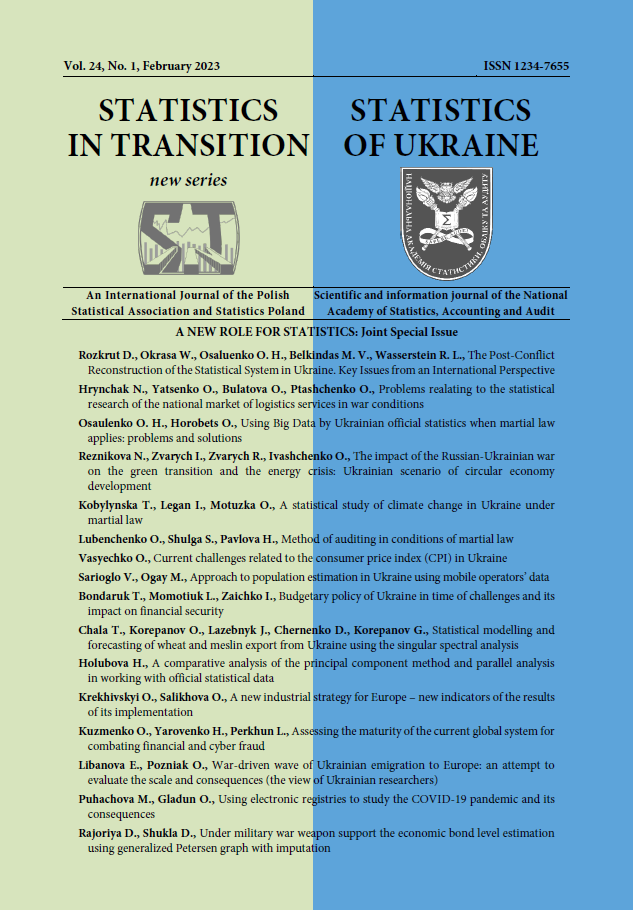ARTICLE
ABSTRACT
In the article there are considered methodical recommendations on the actions of auditors uring martial law. They relate to such stages of the audit as the preparatory phase, the planning phase, the task implementation and the final phase. The preparatory stage requires the identification of the client and the conclusion of an audit agreement. Under martial law, new risks are emerging, systematized by the authors and related to the identification of persons involved in terrorist activities and the proliferation of weapons of mass destruction. The systematization of risks and the use of IT technologies to identify and verify the client allows auditors, as specially designated entities of primary financial monitoring, to identify and freeze the assets of such persons in a timely manner and stop providing any services. At the client acceptance and assignment stage, auditors assess ethical threats. As a result, a working paper has been developed to assess ethical threats in the light of martial law. At the planning stage, special attention should be paid to reviewing risks, namely how military aggression affects the continuity of any business. Clarification of risk factors for termination allows you to plan audit procedures to gather audit evidence and further determine the auditor's opinion on continuity (opinion with an explanatory paragraph, opinion with a reservation, negative opinion, disclaimer of opinion). One of the effective procedures for collecting audit evidence at the stage of the task is inventory.
KEYWORDS
war, risk, business entities.
REFERENCES
Audit Chamber of Ukraine. Shchodo vplyvu viiskovoi ahresii Rosiiskoi Federatsii na finansovu zvitnist ta audytorski zvity [Concerning the influence of the military aggression of the Russian Federation of financial reporting and auditor’s reports]. Retrieved from: https://www.apu.com.ua/wpcontent/ uploads/2022/03/%D0%86%D0%9D%D0%A4%D0%9E%D0%A0%D0%9 C%D0%90%D0%A6%D0%86%D0%99%D0%9D%D0%98%D0%99- %D0%9B%D0%98%D0%A1%D0%A2-%D0%90%D0%9F%D0%A3.pdf [in Ukraine].
Audit Public Oversight Body of Ukraine, (2022). Updated information on reporting by audit entities. Retrieved from: https://www.apob.org.ua/?p=3743&lang=en
Council of the Chamber of Auditors, (2022). Shchodo vplyvu viiskovoi ahresii Rosiiskoi Federatsii na okremi aspekty diialnosti subiektiv audytorskoi diialnosti: Informatsiinyi lyst [Regarding the influence of the military aggression of the Russian Federation on certain aspects of the activities of the subjects of audit activity: Information sheet]. Retrieved from: https://ips.ligazakon.net/document/FN073557 [in Ukraine].
Kyiv School of Economics. Priami zbytky, naneseni infrastrukturi Ukrainy v khodi viiny. [Direct damage caused to the infrastructure of Ukraine during the war]. Retrieved from: https://kse.ua/ua/about-the-school/news/zbitki-naneseniinfrastrukturi- ukrayini-v-hodi-viyni-skladayut-mayzhe-63-mlrd/ [in Ukraine].
Ministry of Finance of Ukraine, (2020). Pro zatverdzhennia Polozhennia pro inventaryzatsiiu aktyviv ta zoboviazan [On the approval of the Regulation on the inventory of assets and liabilities]. Retrieved from: https://zakon.rada.gov.ua/laws/show/z1365-14?lang=en#Text [in Ukraine].
International standards of quality control, audit, inspection, other assurance and related services, (2018). Phoenix Publishing House, 1142 p.
The International Federation of Accountants (IFAC), (2020). Vykorystannia spetsialistiv v umovakh COVID-19, u tomu chysli mirkuvannia shchodo zaluchennia spetsialistiv do audytu z finansovoi zvitnosti [The use of specialists in the context of COVID-19, including considerations regarding the involvement of specialists in the audit of financial statements]. Retrieved from: https://www.ethicsboard.org/publications/using-specialists-covid-19-environment
The State Financial Monitoring Service of Ukraine. (2022). Shchodo mizhvidomchoi koordynatsii systemy finansovoho monitorynhu [On interagency coordination of the financial monitoring system]. Retrieved from: https://fiu.gov.ua/pages/dijalnist/funkcional/news/shhodo-mizhvidomchojikoordinacziji- sistemi-finansovogo-monitoringu.html [in Ukraine].
Verkhovna Rada of Ukraine, (2001). The Criminal Code of Ukraine [Kryminalnyi kodeks Ukrainy]. Retrieved from: https: //zakon.rada.gov.ua/laws/show/2341- 14#Text [in Ukraine].
Verkhovna Rada of Ukraine, (2017). Pro audyt finansovoi zvitnosti ta audytorsku diialnist: Law of Ukraine [About the audit of financial statements and audit activity: Law of Ukraine] Retrieved from: https://zakon.rada.gov.ua/laws/show/2258- 19#Text [in Ukraine].
Verkhovna Rada of Ukraine, (2022). Pro zapobihannia ta protydiiu lehalizatsii (vidmyvanniu) dokhodiv, oderzhanykh zlochynnym shliakhom, finansuvanniu teroryzmu ta finansuvanniu rozpovsiudzhennia zbroi masovoho znyshchennia: Law of Ukraine [On the prevention and countermeasures against the legalization (laundering) of proceeds obtained through crime, the financing of terrorism and the financing of the proliferation of weapons of mass destruction: Law of Ukraine]. Retrieved from: https://zakon.rada.gov.ua/laws/show/361-20#Text [in Ukraine].
